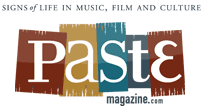 I’m a big fan and subscriber of Paste, an independent U.S.-based monthly (now shifting closer to bi-monthly, with every other issue being a single-topic special edition) magazine focused on music, film, and books, with a passionate spirit.
I’m a big fan and subscriber of Paste, an independent U.S.-based monthly (now shifting closer to bi-monthly, with every other issue being a single-topic special edition) magazine focused on music, film, and books, with a passionate spirit.
Currently, however, they are running a Campaign to Save Paste, soliciting donations to offset operating losses. What does the need for such campaign tell us about the future of online publishing?
Many people, myself included, got hooked on Paste via the CD-sampler which accompanies each issue and lets you hear many of the artists being discussed and reviewed.
Paste has also made interesting moves to reflect the popularity and primacy of the Internet as a mechanism for discovering music, while still retaining their editorial vision and curatorial role.
First, they moved the sampler CD online. Instead of distributing physical CDs with every copy of the magazine sent to subscribers or sold at newstands, the CD is available for download, with subscribers having accounts and print versions containing a code to access the download. Subscribers who prefer the physical CD can still request one.

- 12 Free Albums (downloads) selected by Paste editors, plus often bonus albums
- Digital versions of the magazine, including access to back issues
- Early access to the sampler and magazine
- A Paste t-shirt
- The ability to give gift subscriptions (not VIP but regular) to friends for $10
It’s a great program – allowing the brand evangelists to pay more and get premium access, while also enabling them to spread the brand. (Disclosure: Paste is not a client. I’m just a very happy subscriber and brand enthusiast!).
I wish, in fact, that magazines like Mojo and Q, which I often buy in print while in the UK, would emulate this model: keep publishing in print, but let people choose to subscribe to a digital edition and get the tunes which would otherwise come on a physical CD online.
None of this, however, has enabled Paste to completely avoid the global economic meltdown current recession. They’re recently launched a “Campaign to Save Paste,” calling on readers, musicians, and other supporters to help them get through what they’ve described as “a little cash infusion to make up for running at a loss for a while.” (See Save Paste FAQs).
The campaign itself is very well executed, including a letter to readers, a Facebook Group, a twitter account, over 70 tracks (many rare and otherwise unreleased) made available by musicians and labels to anyone who donates, and even banners supporters can take and embed on their own blogs, myspace profiles, and the like:
So what does this campaign, and the model of Paste in general, tell us about publishing in the age of the assembled web?
The pessimistic view would be that it demonstrates that even a small, dedicated, niche-focused print magazine can’t survive. Music, film, and book bloggers have taken over the curatorial role and publish mp3s, trailers, and samples – often with less respect for the strictures of current copyright than a published magazine can manage. In this view, even though Paste was doing everything right they can’t survive without the voluntary donations of supporters. Philanthropic patronage is the only hope of the print publication.
A more optimistic view, though, would take seriously the version Paste themselves offer. The model is fundamentally sound, subscriptions are growing, and the future looks bright. As they write in the Letter to Paste Readers:
Long-term, Paste will emerge in good shape. Even with the fall-off at the end of the year, 2008 was our best year yet—print subscribers, print ads, online readers and online advertising were all at record levels. Readers (print and online) remain strong. And new advertisers have come on board even in the recession, with more ready when their advertising budgets come back.
In the meantime, we’ve adjusted our business to weather this storm. We’ve cut costs, and we developed a robust online business that’s among the best in the industry. Fundamentally, we’re in good shape and won’t need another appeal down the road.
I have, of course, no visibility into Paste’s finances and can’t really discern which of these views will be more accurate in their specific case. But I truly hope it’s the latter.
